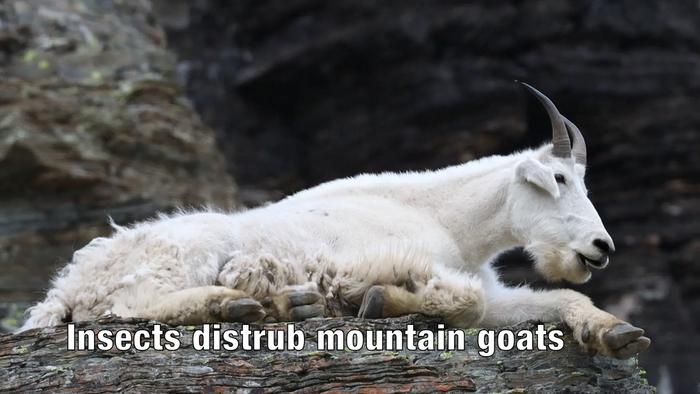Losing summer snow patches may hit mountain goats hard, according to a study that suggests that goats seek out snow to avoid biting insects. Many cold-adapted species take advantage of patches of snow that linger through the summer, as corridors for travel, sources of drinking water, zones for cooling off, or places to play. As the climate changes, many species will have reduced access to snow patches. Forest Hayes and Joel Berger explored what this lack of summer snow might mean for mountain goats (Oreamnos americanus) in Glacier National Park, which has lost 85% of its glaciers since 1850. The team studied goats in the park—along with another population 1,000 km south—completely non-invasively, by filming them using telephoto lenses and counting the number of flank movements per 15-second time interval to calculate respiration rate, as well as the number of ear-flicks per 15-second time interval to measure insect disturbance. Although the authors initially hypothesized that snow patches would offer heat relief, which would slow respiration, it was ear flicking that showed a strong correlation with the presence of snow. Insect disturbance is more than a nuisance for many animals. A heavy tick infestation can kill a moose calf. Less is known about their effect on mountain goats, but losing the relief from biting insects provided by a snow patch may increase their risk of local extirpation.

Credit: Forest P. Hayes
Losing summer snow patches may hit mountain goats hard, according to a study that suggests that goats seek out snow to avoid biting insects. Many cold-adapted species take advantage of patches of snow that linger through the summer, as corridors for travel, sources of drinking water, zones for cooling off, or places to play. As the climate changes, many species will have reduced access to snow patches. Forest Hayes and Joel Berger explored what this lack of summer snow might mean for mountain goats (Oreamnos americanus) in Glacier National Park, which has lost 85% of its glaciers since 1850. The team studied goats in the park—along with another population 1,000 km south—completely non-invasively, by filming them using telephoto lenses and counting the number of flank movements per 15-second time interval to calculate respiration rate, as well as the number of ear-flicks per 15-second time interval to measure insect disturbance. Although the authors initially hypothesized that snow patches would offer heat relief, which would slow respiration, it was ear flicking that showed a strong correlation with the presence of snow. Insect disturbance is more than a nuisance for many animals. A heavy tick infestation can kill a moose calf. Less is known about their effect on mountain goats, but losing the relief from biting insects provided by a snow patch may increase their risk of local extirpation.
Journal
PNAS Nexus
Article Title
Snow patch refugia benefits for species of periglacial zones – evidence from a high elevation obligate
Article Publication Date
7-Nov-2023




